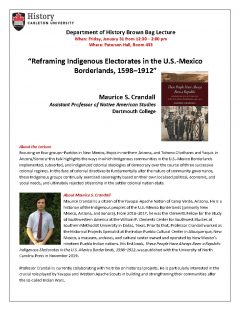Past Event! Note: this event has already taken place.
Maurice Crandall: “Reframing Indigenous Electorates in the U.S.-Mexico Borderlands, 1598–1912”
January 31, 2020 at 12:30 PM to 2:00 PM
| Location: | 433 Paterson History Lounge |
| Cost: | Free |
| Audience: | Anyone |
| Contact Email: | history@carleton.ca |
 The History Department invites you to a talk by Maurice Crandall from Dartmouth College, as part of our Friday Brown Bag Talks. Bring your lunch and join us in the History Department Lounge, 433 Paterson, at 12:30 pm.
The History Department invites you to a talk by Maurice Crandall from Dartmouth College, as part of our Friday Brown Bag Talks. Bring your lunch and join us in the History Department Lounge, 433 Paterson, at 12:30 pm.
About the Lecture
Focusing on four groups–Pueblos in New Mexico, Hopis in northern Arizona, and Tohono O’odhams and Yaquis in Arizona/Sonora–this talk highlights the ways in which Indigenous communities in the U.S.-Mexico Borderlands implemented, subverted, and indigenized colonial ideologies of democracy over the course of three successive colonial regimes. In the face of colonial directives to fundamentally alter the nature of community governance, these Indigenous groups continually exercised sovereignty based on their own localized political, economic, and social needs, and ultimately rejected citizenship in the settler colonial nation-state.
About Maurice S. Crandall
Maurice Crandall is a citizen of the Yavapai-Apache Nation of Camp Verde, Arizona. He is a historian of the Indigenous peoples of the U.S.-Mexico Borderlands (primarily New Mexico, Arizona, and Sonora). From 2016–2017, he was the Clements Fellow for the Study of Southwestern America at the William P. Clements Center for Southwest Studies at Southern Methodist University in Dallas, Texas. Prior to that, Professor Crandall worked as the Historical Projects Specialist at the Indian Pueblo Cultural Center in Albuquerque, New Mexico, a museum, archives, and cultural center owned and operated by New Mexico’s nineteen Pueblo Indian nations. His first book, These People Have Always Been a Republic: Indigenous Electorates in the U.S.-Mexico Borderlands, 1598–1912, was published with the University of North Carolina Press in November 2019.
Professor Crandall is currently collaborating with his tribe on historical projects. He is particularly interested in the crucial role played by Yavapai and Western Apache Scouts in building and strengthening their communities after the so-called Indian Wars.